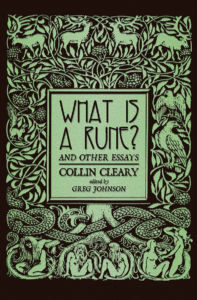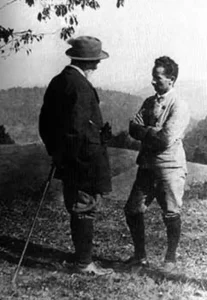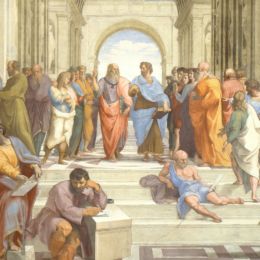3,589 words

Rembrandt, Philosopher Reading, 1631
Spanish translation here
The best way of understanding what metaphysics is, is to understand what it is not. Metaphysics is not a specialized discipline; it is not a theoretical or practical inquiry that deals with a specific set of facts, or tries to change the world in a specific way. Every kind of fact and every kind of activity has some specialized discipline correlated to it. No matter what kind of facts you name, no matter how trivial, chances are that someone has written a doctoral dissertation on it—or will write one someday.
The specialized sciences and disciplines have divided up the entire world into separate domains of facts and parceled them out among one another. No matter what activity you care to name—from tying shoelaces to eating algae to rolfing to collecting mushrooms—there is probably some specialist in it who is willing to teach you how to do it, for a fee.
Metaphysics, then, cannot deal with facts, because all the facts are taken by specialized disciplines. Metaphysics cannot change the world, because all the activities that change the world are taken by specialized disciplines. So, if metaphysics does not deal with facts and does not change the world, what does it do? As Heidegger puts this question:
The whole of beings is the field from which the positive sciences of nature, history, space always secure their domains of objects. Directed straight to beings, these sciences in their totality take charge of exploring everything that is. So it seems that there is no field of investigation left over for philosophy, although from antiquity it has been considered the fundamental science.[1]
Metaphysics begins by taking a step back from action, from attempts to change the world. It is a reflective, contemplative activity that leaves everything as it is. Metaphysics also takes a step back from the specialized sciences and disciplines. And in taking this step back, metaphysics notices that each specialized discipline, because it is specialized, has two blind spots. These blind spots are, moreover, not merely accidental. Rather, they are essential to any specialized discipline as a specialized discipline. One’s attention cannot be in two places at the same time. Therefore, in order for the specialized disciplines to catch sight of their specific objects, they have to be blind to other things. Specifically, the specialized disciplines are blind to two things: (1) they are blind to where and how their subject matter fits into the whole; and (2) they are blind to their own methodological and cognitive presuppositions.
First, because each specialized discipline focuses on its delimited subject matter, it overlooks the question of how its domain of facts is related to other domains of facts within the whole. For instance, biologists, insofar as they are biologists, deal with living things. However, when someone asks how life is related to matter, and if life can be reduced solely to material interactions, this is no longer a strictly biological question, for it cannot be answered with the tools and expertise of biology alone. It is a philosophical question, a question about how two domains of reality—matter and life—are related to one another within the whole.

You can buy Greg Johnson’s Graduate School with Heidegger here
In short, specialized disciplines deal with the parts of the world. Metaphysics deals with the whole. Metaphysics deals with how things—in the broadest possible sense of the term—“hang together”—in the broadest possible sense of that term (to borrow a phrase from Wilfred Sellars). Metaphysics deals with how all the different kinds of facts—all the different realms of being—are related to one another in the big picture. Thus metaphysics gives us a sort of map of the whole, showing how all of the parts are related to one another within it. And, because no map is useful unless it has a little “You are here” sign that allows one to orient oneself in relation to it, metaphysics is especially concerned with the place of man in the cosmos.
The second blind-spot of the specialized disciplines concerns how they know and go about studying their particular subject matters. Because each science is busy looking at facts, it looks through and therefore overlooks the cognitive faculties and methodological presuppositions that make its knowledge possible. For instance, many sciences use logic as a tool. They use it to look at the world, but they do not look at logic itself and ask about its nature and justification. This too is the task of metaphysics.
Metaphysics takes a step back from what shows up to us in the world and asks about how the world shows up to us. It does not deal with particular objects present to particular sciences. It deals with how objects are present to a human knower.
Metaphysics deals with the presence of objects, not objects that are present. Metaphysics seeks to detach presence from what is present. Metaphysics deals with presence as such, and tries to articulate its structure—for instance, in Aristotle’s case, in terms of his table of categories and in terms of the principle of non-contradiction and the other laws of logic.
And, since presence is always presence to a knower, metaphysics deals with the human being insofar as he is a knower. So, again, human nature is a central topic of metaphysics.
The central question of metaphysics is the so-called “ontological” question, the question of “Being as Being,” that Aristotle, in his Metaphysics (the first book to bear that name), describes as follows.
The question that has always been asked and is still being asked today, the ever-puzzling question, is “What is Being (ti to on)?,” that is, “What is Beingness (ousia)?” (1028b).
In Greek, the question of Being is “ti to on.” “On” is “Being.” So the science of Being is “ontology.” Ontology is the central branch of metaphysics. Aristotle arrives at the question of Being as Being by noting that the entire world of facts has been parceled out among specialized and partial disciplines.
As Aristotle puts it, the sciences deal with delimited realms and modes of being—fishy being and froggy being, physical being and chemical being, social being and psychological being, etc.—but none of them deal simply with Being as such, abstracted from all the different concrete ways of being.
The topic of ontology is Being as such—not being as fishy, being as froggy—but simply Being as Being. It asks the question: “What is it to be—to be anything at all?”
It is Being that lies concealed in the blind spot of the sciences. It is ontology that disengages our attention from the objects and practices that absorb the specialized disciplines and everyday awareness. It is ontology that opens our eyes to their concealed background.
Ontology disengages our attention from the parts and turns us toward the whole.
Ontology disengages our attention from the beings that are present and turns us toward their presence as such.
Ontology disengages us from being absorbed in beings, and turns us toward Being.

You can buy Greg Johnson’s From Plato to Postmodernism here
Phenomenology & Ontology
Now, at this point, you should be wondering, “What’s the difference between phenomenology and ontology?” Phenomenology, after all, deals with how beings show up to us. It deals with the presence/absence interplay through which beings become present. And ontology deals with the presence of beings and its basic structures.
Phenomenology takes a step back from the partiality and blindness of the specialized disciplines and asks how they and their different domains fit into the whole, how the whole hangs together. And ontology takes a step back from the partiality and blindness of the specialized disciplines and asks how they and their different domains fit together, how they fit into the big picture.
Phenomenology gives man a central place within the whole, for it is man to whom the world shows up. And ontology gives man a central place within the whole, for of all the beings in the world, only man asks the question of Being. It is man who notices the different kinds of beings in the world and thus divides the whole up into parts. It is man who then wonders how the parts fit together in the big picture. And if ontology deals with the presence of beings, then it must deal with man, for it is man to whom beings are present.
So, again: What’s the difference between phenomenology and ontology?
This question is Heidegger’s question as well. And his answer is: There is no difference between phenomenology and ontology, if we understand each of them properly. Heidegger claims, moreover, that phenomenology was implicit in ontology from the very beginning. He writes:
Already in the beginnings something remarkable comes to light. Philosophy seeks to elucidate Being via reflection on the thinking of beings (Parmenides). Plato’s disclosure of the Ideas takes its bearings from the soul’s conversation (logos) with itself. The Aristotelian categories originate in view of reason’s assertoric knowledge. Descartes explicitly founded first philosophy on the res cogitans [thinking substance]. Kant’s transcendental problematic moves in the field of consciousness. Now, is this turning of the gaze away from beings and onto consciousness something accidental, or is it finally demanded by the specific character of what has been constantly sought for under the title “Being” as philosophy’s field of problems?[2]
Heidegger’s thesis is that the phenomenon that Plato and Aristotle called “Being” is the same phenomenon that later philosophers came to call “consciousness.” It is the phenomenon that Heidegger calls “presencing” or the interplay of presence and absence, which is the topic of phenomenology. In the Introduction to Being and Time Heidegger states—first elliptically and then straightforwardly—the identity of Being and presencing, of ontology and phenomenology. He writes:
What is it that phenomenology is to “let be seen”? What is it that is to be called “phenomenon” in a distinctive sense? What is it that by its very essence becomes the necessary theme when we indicate something explicitly?
That is: What is the phenomenon studied by phenomenology?
Manifestly it is something that does not show itself at first and for the most part, something that is concealed, in contrast to what at first and for the most part does show itself.
That is: the phenomenon studied by phenomenology is not readily apparent; it is first and for the most part hidden or concealed. By contrast, the things that are readily apparent make up the world around us.
But at the same time it [this concealed something] is something that essentially belongs to what at first and for the most part shows itself, indeed in such a way that it constitutes it sense and ground [Sinn und Grund].
That is: The phenomenon studied by phenomenology may be hidden, but it is essentially connected with those things that are not hidden: the things that fill the world around us. The phenomenon that phenomenology studies is the “sense” and the “ground” of the things in the world around us. By “sense and ground,” Heidegger means that the phenomenon studied by phenomenology is that which makes it possible for things in the world to show up to a human knower.
Heidegger then goes on to reveal that Being is the phenomenon studied by phenomenology:
But what remains concealed in an exceptional sense, or what falls back and is covered up again, or shows itself only in a distorted way, is not this or that being but rather, as we have shown in our foregoing observations, the Being of beings.[3]
For Heidegger, the Being of beings is that which makes beings present to a knower.
Metaphorically, the Being of beings is the “light” in which beings show up to knowers.
Being is the process by which beings are disclosed or made manifest to us.
Being is the presencing of beings, the presence/absence interplay through which beings are given.
And, if Being is that which allows beings to show up to us, and if phenomenology is the study of the way in which beings show up to us, then Being is the object of phenomenology.
If phenomenology studies Being, and ontology studies Being, then phenomenology and ontology are simply two different words for the same thing: the study of Being.
Heidegger writes:
Phenomenology is the way of accessing, and the manner of demonstratively determining, what is to become the theme of ontology. Ontology is possible only as phenomenology. The phenomenological concept of the phenomenon, as self-showing, means the Being of beings . . .[4]
Thus far, we have covered what phenomenology is and what metaphysics—or ontology—is. Phenomenology deals with the presencing of beings. Ontology deals with Being. We have also seen that Heidegger identifies Being with the presencing of beings through the interplay of presence and absence. He identifies phenomenology and ontology. Now is the time to make clear some of Heidegger’s key terminology.
Ontological Difference

You can buy Jef Costello’s Heidegger in Chicago here
Central to Heidegger’s thought is the idea of the “ontological difference.” The ontological difference is the difference between Being and beings. We are beings; the things in the world around us are beings. But Being itself is not just another being. It is not a being in the world. No matter where we go, we are not going to find a particular being that is also Being itself.
Nor is Being a super-being outside the world. Being is not God, for God is a particular being.
Translated into the language of presence and absence, the ontological difference is the difference between presence and what is present, between absence and what is absent. The difference between a being and its presence and absence can be appreciated through the fact that the being remains the same, whether it is present or absent; thus it cannot be identified with either of the two.
Being is the presence/absence of that-which-is-present/ absent. Presence/absence is always the presence/absence of that-which-is-present/absent, but it cannot be reduced to that-which-is-present/absent. Presence/absence is different from, but inextricably tied to, that-which-is-present / absent.[5]
The Metaphysics of Presence
The central thesis of Being and Time is that throughout the history of ontology, the understanding of Being is determined by a particular understanding of time. Heidegger’s task is
. . . interpreting the very basis of ancient ontology in light of the problem of Temporality. Here it becomes evident that the ancient interpretation of the Being of beings is that it is oriented toward the “world” or “nature” in the broadest sense and that it indeed gains its understanding of Being from “time.” The outward evidence of this—but of course only outward—is the determination of the meaning of Being as parousia or ousia, which means ontologically and temporally “presence.” Beings are grasped in their Being as “presence”; that is to say, they are understood with respect to a definite mode of time, the present.[6]
This interpretation of Being in terms of presence is not confined to the ancients only. It is the underlying interpretation of Being throughout the entire ontological tradition. Jacques Derrida, following Heidegger, calls this interpretation of Being the metaphysics of presence. The “presence” in the metaphysics of presence has three dimensions. First, there is temporal presence, the present as opposed to the past and the future. Second, there is spatial presence, as opposed to absence. Third, there is cognitive presence, presence to a knower. The metaphysics of presence defines Being as that which is (spatially and cognitively) present to a knower in the (temporal) present.
The metaphysics of presence is an error, simply because it is a form of reductionism. Again, for Heidegger, Being is the presentation of beings to a knower through an interplay of presence and absence. Furthermore, Heidegger holds that this process is temporally dynamic. We make beings present in light of our projects for the future, which are based upon our pasts. The same world looks very different to us when we are running to and fro trying to meet a looming deadline or when we have no pressing engagements and a lot of time on our hands. So the way things show up in the present is determined by our expectations for the future, and our expectations for the future are determined in large part by what has happened in the past.
The metaphysics of presence seeks to eliminate this dynamic temporal dimension from Being, conceiving being as enduring, unchanging presence or substance. The metaphysics of presence also excludes the dimension of absence from Being. But this is an error, because time and absence are real aspects of Being, thus a good account of Being has to take them into account, not just leave them out.
Dismantling or “Deconstruction”?

You can buy Collin Cleary’sWhat is a Rune?, featuring extensive discussions of Heidegger, here
In section 6 of the second chapter of the Introduction to Being and Time, Heidegger claims that the metaphysics of presence is revealed by what he calls the Destruktion of the history of ontology. The translator renders Destruktion as “destructuring” but the more common rendition is “deconstruction,” another term associated with Derrida. By “deconstruction” Heidegger means the task of taking metaphysics apart brick by brick and working his way down to the foundations of Western metaphysics in the lived experience of the Greek philosophers.
Deconstruction does not mean destruction. It is not an attempt to raze metaphysics to the ground and start over. Rather, it is the attempt to recover the original motivating experiences that got metaphysics going in the first place. Specifically, it tries to recover the temporal dynamism and absential aspects of Being and tries to figure out why they were later passed over.
Dasein
The word “Dasein” appears frequently in Heidegger translations. It is capitalized and usually is not in italics. Years ago, a friend told me the story of a woman who started reading Heidegger but quickly stopped because she concluded that she would first have to read this Dasein person Heidegger kept mentioning. So, who is this Dasein person? The answer is: You are Dasein. Dasein is not a proper name. Dasein is the knower to whom beings are present.
But why does Heidegger use the word “Dasein”? why not simply use the word “knower” or “subject” or “human being”? Dasein is a German word for existence, for concrete thereness. Heidegger, however, hears Dasein as a compound of two other German words: Da and Sein. Da means both here and there. It means the place or the whereabouts of something. Sein is the German word that we translate as “Being” with a big “B.”
Putting the two together, Heidegger uses the word Dasein to mean the place of Being or the whereabouts of Being. Dasein, as the one to whom beings show up, is the place of this showing. This showing is Being. So Dasein is the place of Being.
Heidegger speaks of Dasein rather than “human being,” “reason,” or “subjectivity” because he wants to resist the universalism implicit in these concepts. Human nature is one and the same; reason is one and the same; subjectivity is one and the same. Which would imply that Being is one and the same as well, meaning that beings would show up the same way or have the same meaning at all times and places.
But Dasein is always pluralized by time and place. Thus Being is pluralized as well, meaning that beings show up in different ways and have different meanings in different times and places. Traditional philosophy seeks an objective, cosmopolitan “view from nowhere.” Heidegger’s Dasein is a view from somewhere. But Dasein is not to be understood as the isolated individual, for beings show up to us in terms of shared meanings, i.e., languages and cultural practices.
Being & Culture
I want to conclude by saying a few words about the relationship of Being and culture. Heidegger holds that Being is the interplay of presence and absence through which beings show up to the knower, Dasein. The element of presence in Being consists simply of any form of direct awareness. The element of absence is any cognitive commerce with beings in their absence.
Heidegger held that our capacity to deal with beings in their absence is grounded in the faculties of memory and imagination, in language, and in the various meaningful practices and attitudes that make up a culture. Our culturally rooted attitudes and practices are an absolutely crucial element in our experience of the world.
One of the first things that one notices about a different culture is its different attitudes toward space and time. All human societies have a sense of the appropriate personal space that each person occupies and that cannot be transgressed without some sort of violation of propriety. All cultures also have their own characteristic perceptions of time. Cultures with cyclical conceptions of time tend to be extremely conservative and also very close to and rooted in nature. Such cultures are less likely to regard change as progress and more likely to regard it as degeneration and eccentricity. Cultures with linear conceptions of time are much more comfortable with change and liable to describe it as progress rather than decay or eccentricity. Some cultures take things at a more leisurely pace than others.
These different cultural attitudes and characteristic practices allow the world to show up in different ways. Thus, when we take a culture as a whole—looking both at its characteristic practices and attitudes and at the different ways they allow the world to show up to us—it is perfectly legitimate to identify Being and culture, and different cultures with different ways of Being.
If you want to support Counter-Currents, please send us a donation by going to our Entropy page and selecting “send paid chat.” Entropy allows you to donate any amount from $3 and up. All comments will be read and discussed in the next episode of Counter-Currents Radio, which airs every Friday.
Don’t forget to sign up for the twice-monthly email Counter-Currents Newsletter for exclusive content, offers, and news.
Notes
[1] Martin Heidegger, “The Idea of Phenomenology,” trans. Thomas J. Sheehan, Listening 13 (1977), p. 111.
[2] Heidegger, “The Idea of Phenomenology,” p. 111.
[3] Martin Heidegger, Introduction to Being and Time, trans. Joan Stambaugh, in Basic Writings, ed. David Farrell Krell (San Francisco: Harper, 1977), pp. 81–82.
[4] Basic Writings, p. 82.
[5] To adopt the maddeningly dense but clear and rigorous style of Thomas Prufer’s “Husserl, Heidegger, Early and Late, and Aquinas” in his Recapitulations: Essays in Philosophy (Washington, D.C.: The Catholic University of America Press, 1993).
[6] Basic Writings, pp. 69–70.







 4,642 words
4,642 words 185 words / 1: 53:02
185 words / 1: 53:02




